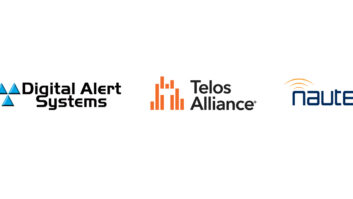AV/IT Training and Certification Courses to Consider
Mar 13, 2014 10:51 AM,
By Jessaca Gutierrez
AV/IT TRAINING AT INFOCOMM 2014
Check out InfoComm University’s Three-day Networking Courses
June 15-June 16, 8 a.m. – 5 p.m.
Networking Technology
What it is: A core knowledge class is for all AV professionals. It teaches the basics of information technology and IP networking. You’ll learn to troubleshoot the network that supports your AV system. Section tests help confirm understanding while interactive content and exercises increase learning retention. Labs allow you to explore networking concepts on your own computer to see how they work.
- Learn the basics of networking from an AV perspective.
- Review how to discuss AV network requirements with your IT stakeholders.
- Compare and contrast the most common network-based AV transmission protocols.
- Interpret IP addresses and subnets.
- Identify network security threats and countermeasures.
- Use common network diagnostic tools and perform basic network troubleshooting.
Prerequisites: None
RUs: 24
Networked AV Systems
What it is: Networked AV Systems is a blend of AV and IT technologies. This course discusses the approaches and needs for AV and IT personnel. At the conclusion of the course, you will have the background and vocabulary to discuss with your IT team why a piece of gear should or should not be on the network.
- Explore the impact of audiovisual applications on enterprise networks.
- Discover client needs for networked systems, trade-offs between quality and bandwidth, and how to navigate conflicts between network policies and customer demands.
- Get the background you need to cross the AV/IT cultural divide and specify devices for enterprise networks.
- Learn how to agree upon, document, and stick to shared expectations for networked systems.
- Discuss remote monitoring and management, streaming, conferencing and other software applications.
Prerequisites: Students should have a CTS(R)-level understanding of AV technologies and design principles and a CompTIA Network, plus level understanding of networking technologies and design principles. You can take the free 40-question pre-test to see if you’re ready for this class.
RUs: 24
Cisco Certified Network Associate (CCNA)
What it is: An entry-level program for foundational networking for network specialists, administrators, and support engineers with 1 to 3 years of experience. Integrators with CCNA Routing and Switching certification can install, configure, operate, and troubleshoot medium-size routed and switched networks.
Prerequisite: None
Exams: Cisco Certified Network Associate Exam (200-120 CCNA) or Interconnecting Cisco Networking Devices Part 1 (100-101 ICND1) and Interconnecting Cisco Networking Devices Part 2 (200-101 ICND2)
The 200-120 CCNAX is the accelerated composite exam associated with the Cisco CCNA Routing and Switching certification. Candidates can prepare for this exam by taking the Interconnecting Cisco Networking Devices: Accelerated (CCNAX) course. Alternatively, integrators can split up the exam into two parts with the 100-101 ICND1 and 200-101 ICND2 exams. The ICND1 coursework covers and tests a candidate’s knowledge and skills required to successfully install, operate, and troubleshoot a small-branch office network. Exam topics include operation of IP data networks; LAN switching technologies; IP addressing (IPv4 and IPv6); IP routing technologies; IP services (DHCP, NAT, ACLs); network device security; and basic troubleshooting.
The 200-101 ICND2 coursework and exam cover all the skills required to successfully install, operate, and troubleshoot a small to medium-size enterprise branch network. The exam includes topics on LAN switching technologies, IP routing technologies, IP services (FHRP, syslog, SNMP v2 and v3), troubleshooting, and WAN technologies.
Update: The Society of Motion Picture and Television Engineers (SMPTE) added CCNA Security to the society’s current roster of CCNA virtual course offerings. The SMPTE Professional Development Academy offers this intensive 12-week virtual course along with the four CCNA Routing and Switching courses—Introduction to Networks (CCNA1), Routing and Switching Essentials (CCNA2), Scaling Networks (CCNA3), and Connecting Networks (CCNA4)—through the SMPTE Virtual Classroom. The SMPTE CCNA Security course provides a next step for individuals who want to enhance the CCNA-level skill set. The curriculum provides an introduction to the core security concepts and skills needed for the installation, troubleshooting, and monitoring of network devices to maintain the integrity, confidentiality, availability, and overall security of data and devices. CCNA1 and CCNA2 are prerequisites for this course.
These SMPTE Virtual Classroom programs are blended-learning courses using a “flipped classroom” education model; participants spend time on independent study and ask questions via the virtual classroom’s online discussion forum, and then participate in live weekly instructor coaching sessions where the instructor answers questions and assists with clarifying more complex topics and activities in realtime.
Info: www.smpte.org/education/courses and www.cisco.com/web/learning/certifications
Cisco Video Network Specialist/Cisco Certified Network Associate Video CCNA Video)
What it is: A job-role-focused training and certification program for video and collaboration products. You will learn to deploy video end-points, set-up new users, and operate networked video solutions. This certification validates an individual’s knowledge of installing, operating and supporting networked video solutions and how to deploy and optimize the product features and benefits.
Prerequisites: None
Exams: Implementing Cisco Video Network Devices (200-001 VIVND) and Introducing Cisco Voice and Unified Communications Administration (640-461 ICOMM)
The Cisco Video Network Specialist only need to pass the 200-001 VIVND exam. It tests a candidate’s knowledge of configuration and troubleshooting of video endpoints.
Those pursuing the CCNA Video certification will need to pass 2001-001 VIVND as well as the 640-461 ICOMM exam, which is part of the the Cisco CCNA Voice certification. It tests a candidate’s knowledge of the architecture, components, functionalities, and features of Cisco Unified Communications solutions. The exam also tests the knowledge needed to perform tasks such as system monitoring, moves, additions, and changes on Cisco Unified Communications Manager, Cisco Unified Communications Manager Express, Cisco Unity Connection, and Cisco Unified Presence.
Cisco Certified Entry Networking Technician (CCENT)
What it is: Integrators with CCENT certification would be able to install, operate, and troubleshoot a small enterprise branch network, including basic network security. The curriculum covers networking fundamentals, WAN technologies, basic security and wireless concepts, routing and switching fundamentals, and configuring simple networks. The course work is the first step toward achieving CCNA certification for medium-size enterprise branch networks with more complex connections.
Prerequisites: None
Exams: Interconnecting Cisco Networking Devices Part 1 (100-101 ICND1) This exam is the first step to achieving the CCNA Routing and Switching certification. Candidates can prepare for this exam by taking the Interconnecting Cisco Networking Devices Part 1 (ICND1) course. This exam tests a candidate’s knowledge and skills required to successfully install, operate, and troubleshoot a small branch office network. The exam includes topics on the operation of IP data networks; LAN switching technologies; IP addressing (IPv4 and IPv6); IP routing technologies; IP services (DHCP, NAT, ACLs); network device security; and basic troubleshooting.
Cisco Certified Network Professional (CCNP)
What it is: CCNP covers the planning, implementation, and troubleshooting of local- and wide-area enterprise networks. It also provides the skills necessary to work with specialists—such as the client’s IT staff—on advanced security, voice, wireless, and video solutions. Cisco recommends having at least one year of networking experience.
Prerequisite: Valid Cisco CCNA Routing and Switching certification or any Cisco CCIE certification can act as a prerequisite.
Exams: Implementing Cisco IP Routing (642-902 ROUTE), Implementing Cisco IP Switched Networks (642-813 SWITCH), AND Troubleshooting and Maintaining Cisco IP Networks (642-832 TSHOOT)
The ROUTE 642-902 is a qualifying exam for the CCNP, CCIP, and CCDP certifications. The exam will certify that the successful candidate has the knowledge and skills necessary to use advanced IP addressing and routing in implementing scalable and secure Cisco ISR routers connected to LANs and WANs. The exam also covers configuration of secure routing solutions to support branch offices and mobile workers.
The SWITCH 642-813 is a qualifying exam for the CCNP and CCDP certifications. The SWITCH 642-813 exam will certify that the successful candidate has important knowledge and skills necessary to plan, configure and verify the implementation of complex enterprise switching solutions using Cisco’s Campus Enterprise Architecture. The SWITCH exam also covers secure integration of VLANs, WLANs, voice and video into campus networks.
The TSHOOT 642-832 is a qualifying exam for the CCNP certification. The exam will certify that the successful candidate has important knowledge and skills necessary to plan and perform regular maintenance on complex enterprise routed and switched networks and use technology-based practices and a systematic ITIL-compliant approach to perform network troubleshooting.
Cisco Certified Design Associate (CCDA)
What it is: CCDA covers the skills required to design basic campus, data center, security, voice, and wireless networks.
Prerequisite: A valid CCENT or a valid CCNA Routing and Switching or any CCIE certification can act as a prerequisite.
Exams: 640-864 DESGN, which requires a foundation or apprentice knowledge of network design for the Cisco converged networks based on borderless network architecture. CCDA-certified professionals can design routed and switched network infrastructures and services involving LAN, WAN, wireless, and broadband access for businesses and organizations.
CompTIA Network+
What it is: A common entry-level program. It covers network technologies, installation and configuration, media and topologies, management, and security. CompTIA Network+ also is a prerequisite option for joining the Apple Consultants Network. That makes it worth considering if you work in higher ed, where faculty and students frequently expect to be able to use their iOS or Mac device for presentations. Apple hardware also is increasingly common in the enterprise market, due partly to the growing number of companies with bring-your-own-device (BYOD) policies.
Exam Prerequisite: CompTIA A+ certification and nine months networking experience
Exam: N10-005 or JK0-019 (for CompTIA Academy Partners only)
Info:certification.comptia.org/getCertified/certifications/network.aspx
Microsoft Certified Solutions Associate (MCSA)
What it is: MCSA is the certification necessary for entry-level Microsoft IT professional and developers. MCSA also is worth considering because it’s a prerequisite to MCSE (see below).
Prerequisite: None
Exam: Depends on specialization: Windows Server 2012, Windows Server 2008, Windows 8, Windows 7, SQL Server 2012, SQL Server 2008, or Office 365.
Info: www.microsoft.com/learning/en/us/mcsa-certification.aspx
Microsoft Certified Solutions Expert (MCSE)
What it is: MCSE is the certification validates your ability to build server network solution. MCSE is a family of eight certifications, many of which are relevant to AV applications. For example, MCSE: Private Cloud could apply to cloud-based video services.
Prerequisite: MCSA certification (can be done in conjunction with taking necessary coursework and exams for MSCA)
Exams: Depends on specialization: Server Infrastructure, Desktop Infrastructure, Private Cloud, Data Platform, Business Intelligence, Messaging, Communication, or SharePoint.
Info: www.microsoft.com/learning/en/us/mcse-certification.aspx
VMware Certified Professional – Cloud (VCP)
What it is: VCP-Cloud also can be useful for working in cloud-based AV environments, including public, private, and hybrid architectures. This certification covers the installation, configuration, and administration of a cloud environment using vCloud Director and related components.
Prerequisites: Qualifying coursework
Exam: VCP-Cloud (VCPC550)
Info:http://mylearn.vmware.com/mgrReg/plan.cfm?plan=32558&ui=www_cert







